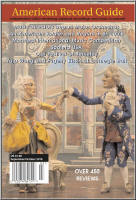Texte paru dans: / Appeared in: |
|
|
Outil de traduction ~ (Très approximatif) |
|
|
Reviewer: John
W. Barker Michel-Richard de Lalande (1657-1726) was the favorite church musician of King Louis XIV of France, who was bored by formal Mass celebrations and preferred that his chapel be filled with shorter and more concise settings of Scriptural and liturgical texts. As Lalande developed his skills under the king’s encouragement, the resulting product was a newly-defined “motet”, divided into grand motets, for
soloists, choir, and
instruments, and petits motets for one or more soloists with a few
instruments (sometimes with material recycled from the larger works). With the grand motets he gave definition to the liturgically triumphant sounds of the grand siècle. They supplied both the major component and the dominant stylistic model for ensuing French Baroque sacred music. We know of some 77 works he composed in this idiom, from the 1680s through the next four decades. Though a number of them have been lost, the remainder have not found a firm place in present-day performances and have only barely been tapped in recordings.
The three items presented here are a small venture into the full output. They also illustrate the writing from the earlier years of his employment. The first of them, the eight-movement Deitatis Majestatem, uses a jumble of Psalm texts. It apparently dates from 1681 or 1682, just before the composer’s formal court appointment, and is a model for the style he would consolidate and extend. Ecce Nunc Benedicite (1686) is a setting in three movements of Psalm 133. The longest work here is the extended treatment of the Te Deum, composed in 1684. It superseded its earlier exemplar, by Lully, and one can hear its influence n the superlative, celebrated, and much-recorded setting by Marc-Antoine Charpentier. By itself, it renews the feeling that the “Deus” who is given such fulsome praise was not the heavenly deity but the Sun King himself.
The performances here are exemplary in terms of execution and stylistic security. Dumestre has been building a good reputation in this literature. He has at his disposal a choir of 28 mixed voices and an orchestra of 30 period players. Tenor Auvity is the only soloist with much recognizability, but all of them sing handsomely. The fine recording was made in the chapel of Versailles, giving it a kind of sonic authenticity. Texts and translations. This is a good start on Delalande, but we need a lot more. | |
|
|
|
|
Cliquez l'un ou l'autre
bouton pour découvrir bien d'autres critiques de CD |
|




